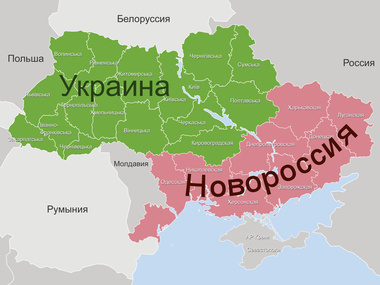This article was originally published by the Jamestown foundation
Both due to the other challenges Ukraine faces and because its leaders believe a democratic and European government should not become involved in religious affairs, Ukrainian officials have avoided tackling key issues of religion. But now Moscow Patriarch Kirill has left Kyiv with little choice by officially declaring
(on May 24) that the Ukrainian Orthodox Church of the Moscow Patriarchate is no longer obligated to obey the “godless” Ukrainian authorities. Such a pronouncement is a direct challenge to Ukrainian sovereignty and an indication of just how important Russian control of Ukraine is for the Moscow Patriarchate and for the Kremlin.
If the Moscow Patriarchate is successful in promoting this point of view among the roughly one-fifth of Ukrainians who are currently part of its faith community—a group roughly twice as large as those who backed the EuroMaidan demonstrations initially—Moscow will be in a position to block Kyiv’s moves toward Europe regardless of what happens on the battlefield. But if the Moscow Patriarchate fails as a result of a clever policy on the part of Kyiv, not only will the Kremlin arguably lose in Ukraine but the Moscow Patriarchate will provoke “a parade of sovereignties” among Orthodox Churches in other post-Soviet countries. Consequently, the Russian Orthodox Church will cease to be the largest Church in the Orthodox world, and it will find its influence both in Eurasia and more generally seriously reduced.
Thus, the struggle Kirill has now forced the Ukrainian authorities to join may be even more fateful not only for Ukraine but for the entire post-Soviet space than anything that may be going on the other battlefields of President Vladimir Putin’s war against his neighbors.
On the Hvylia portal, Ukrainian analyst Igor Tyshkevich provides evidence for these conclusions. First, he details the way in which Moscow Patriarch Kirill has accused the Ukrainian regime of “godlessness” and thus relieved Ukrainians of the general requirement among the Orthodox faithful to obey their government. But even more importantly, Tyshkevich outlines why this declaration is a dangerous act of desperation by Moscow, why the Russian Church and the Russian government think they can get away with it, and why the still-reluctant Ukrainian authorities could—if they prove clever enough—turn the tables on Moscow and affect far more than Ukraine’s own fate.
Kirill’s statement, Tyshkevich points out, was a high-risk move reflecting the pressure the Russian Orthodox leader is under from the Kremlin to help out with Moscow’s war effort. Furthermore, Kirill’s declaration was motivated by the threat that current changes in Ukraine pose to the Moscow Patriarchate. However, the Ukrainian analyst notes that Kirill’s open support for the Russian war effort is also dangerous as it is already calling into question the Russian Church’s own doctrine on just war and costing it influence in Ukraine and elsewhere. Over the last four years, Tyshkevich notes, the share of Ukrainians who declare themselves members of Churches subordinate to the Moscow Patriarchate has fallen from 25.9 percent of the Ukrainian population to 20.8 percent.
Despite that trend, one that shows no signs of changing (see EDM, May 20), both Putin and Kirill have decided they can play the religious card with relative impunity and a high probability of success. That is because the Ukrainian authorities have been unwilling to respond effectively. Any forceful actions in this area by Kyiv will be portrayed by Moscow as “a demonstration of the undemocratic nature” of the Ukrainian government and as an indication of a deep “split” in Ukrainian society. And Moscow—both civil and religious—is even more committed to maintaining the Russian Church’s position in Ukraine because it gives Moscow allies elsewhere in the Orthodox world.
But if Ukraine is able to respond cleverly and effectively and move toward creating a national autocephalous Orthodox Church not subordinate to Moscow, Kyiv will be able to turn the tables on Russia and transform itself from “a battlefield” of religious and political affiliations into a major player in that civilizational struggle, Tyshkevich suggests.
Simple statistics show why. The Moscow Patriarchate currently controls 30,675 Orthodox parishes, but only 14,996 are in the Russian Federation itself. Its largest foreign presence is in Ukraine where there are currently 11,358 parishes subordinate to the Moscow Patriarchate. But if the Orthodox of Ukraine became part of a single autocephalous Ukrainian Orthodox Church, that body would have 17,304 parishes, more than the Moscow Patriarchate has in Russia itself. Indeed, the Ukrainian Church would be the second largest Orthodox Church in the region. Romania’s Orthodox Church, with its 15,717 parishes—not counting Moldovan ones, which might join it—would be the largest; and the Moscow Church would be third.
But Moscow would suffer an even greater decline than that: “The exit of Ukraine from the zone of influence of the Russian Orthodox Church would automatically lead to the beginning of a parade of sovereignties” (Hvylya.net, May 28). Romania would likely gain control of many Moldovan parishes, and Moscow would lose its control, wealth and influence elsewhere as well, Tyshkevich argues. Achieving that outcome will require the Ukrainian authorities to think strategically. The stakes are not only high for Kyiv to achieve victory on the battlefield in eastern Ukraine, but also potentially for the control of the religious hearts and minds of the adherents of Orthodoxy across the entire post-Soviet space.





